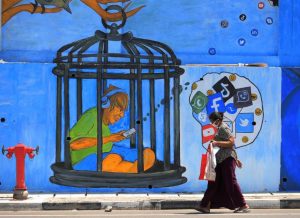The school system in Maine’s largest city has is facing a civil rights complaint alleging the school has been discriminating against employees on the basis of skin color.
Parents Defending Education (PDE), a 501(c)3 non-profit group that advocates against partisan indoctrination in schools, said Tuesday it had filed the complaint with the U.S. Department of Education’s Office of Civil Rights alleging that the Portland School System has discriminated against staff members on the basis of race, color, or national origin.
According to the group, the Portland School System has regularly organized an activity — the “BIPOC Community Circle” — that excludes certain teachers and school employees on the basis of their skin color.
BIPOC is a term used by liberal activists and some academics to denote people who are black, indigenous, or people of color, but in some situations, such as with the Portland schools, the term also includes people of Asian and Middle-Eastern descent, and people who are “Latinx,” which is a word white liberals invented to refer to people of Hispanic descent.
In practice, BIPOC typically means everyone except white people.
“As the Department of Education is no doubt aware, segregation on the basis of race raises concerns that Portland Public Schools has received federal funds in violation of Title VI of the Civil Rights Act of 1964, which declares that ‘no person in the United States shall, on the ground of race, color, or national origin, be excluded from participation in, be denied the benefits of, or be subjected to discrimination under any program or activity receiving Federal financial assistance,’” PDE President Nicole Neily said in the letter.
The Portland School System makes no effort to hide the racially exclusive “affinity groups.” On the system’s website, school officials say the No-Whites-Allowed group began organizing in 2017.
“We hold regular social gatherings and provide career pathways support and emotional support and advocacy,” the website says, suggesting the school regularly provides material career benefits that are only available to people with a certain skin color.
The Portland School System’s website also links to several blog posts defending a progressive version of racial segregation.
In “Why People of Color Need Spaces Without White People,” author Kelsey Blackwell makes the case for race-based exclusivity.
“In integrated spaces, patterns of white dominance are inevitable,” she writes. “These patterns include things like being legitimized for using academic language, an expectation of “getting it right” (i.e., perfectionism), fear of open conflict, scapegoating those who cause discomfort, and a sense of urgency that takes precedence over inclusion.”
Published in the Arrow Journal, Blackwell’s byline describes her as a “somatic coach, writer, and facilitator committed to fearlessly creating spaces for women and PoC to trust and follow the wisdom of their own bodies so they may powerfully shine their lights in a world that sorely needs this brilliance.”
“The values of whiteness are the water in which we all swim,” she continues. “No one is immune. Those values dictate who speaks, how loud, when, the words we use, what we don’t say, what is ignored, who is validated and who is not. Unless we are actively and persistently dismantling these constructs, we are abiding by them.”
Blackwell acknowledges that the practices she advocates are very similar to segregation, but prejudice against white people, she says, is different because “white people do not experience the systemic racism that makes it hard for them to find jobs, housing, healthcare, and justice in the legal system.”
For her, creating spaces like the “BIPOC Community Circle” is not an act of oppression, but rather a response to oppression.
On the question of inclusivity, a cherished liberal value, Blackwell rejects it.
“Personally, I’m not interested in being in an “inclusive space,” she writes. “I want to be with Black femme people.”
In another piece endorsed by the Portland School System, educator and activist Paul Kivel, who is a white man, makes a robust defense segregated spaces.
“It is particularly hypocritical for white people to complain about people of color being separatist,” Kivel writes.
“For the last 500 plus years, it is white people who have excluded people of color from our homes, ‘our’ schools, ‘our’ workplaces, ‘our’ neighborhoods and from ‘our’ country,” he writes.
Though Kivel acknowledges these are historical practices, he contends that “even today people of color are routinely excluded, harassed or told to leave and ‘go home’ by white people,” though he doesn’t cite a particular example.
Kivel’s other arguments rest primarily on broad generalizations about individuals on the basis of their skin color.
“Rarely do we whites sit back and listen to people of color without interrupting, without being defensive, without trying to regain attention for ourselves, without criticizing or judging,” he generalizes.
Despite these arguments, PDE maintains that the Portland School System’s segregationist staff policies are a violation employees’ civil rights. In their complaint, PDE cites a 2015 case in which the Department of Education found that student assemblies that excluded white students violated the Equal Protection Clause and Title VI.
“Accordingly, we ask that the Department promptly investigate the allegations in this complaint, act swiftly to
remedy unlawful policies and practices, and order appropriate relief,” Neily wrote.




